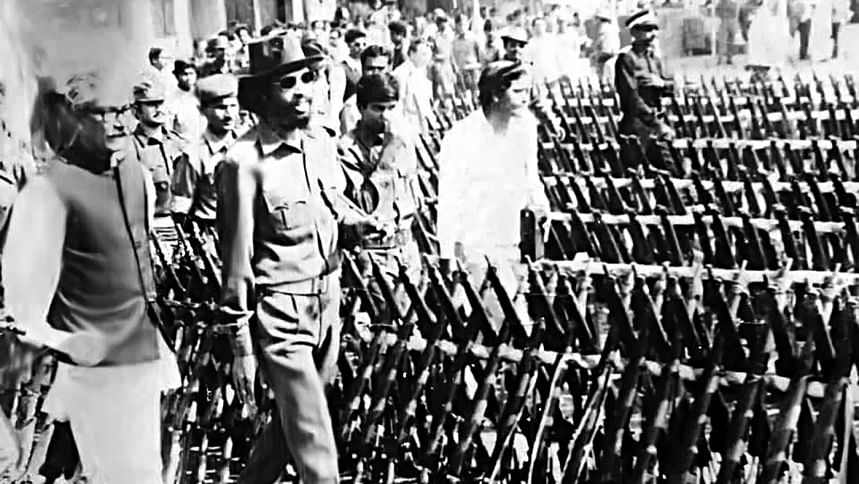The wonder of guerilla warfare in 1971

In 1971, the people of Bangladesh united to fight the occupying Pakistani forces and their local collaborators.
Against the powerful Pakistani military, which was armed with advanced weaponry, armaments, artillery and tanks, the Bangladeshi people hardly had any means to fight back. As such, they adopted guerrilla warfare by forming small groups of freedom fighters, armed with their bravery and die hard valour.
One such guerilla groups was the famous Kaderia Bahini in Tangail district, which put up a strong resistance against the Pakistani army in the region.
The force not only seized Tangail's freedom from occupation, but also went on to emerge as a wonder of guerrilla warfare, with its name spread even beyond the country's borders.
Kaderia Bahini was formed in the Tangail region on April 19, 1971, led by legendary freedom fighter Abdul Kader Siddique, a civilian guerrilla fighter also known as Bagha Siddique (Tiger Siddique).
With 17,000 regular freedom fighters and 70,000 volunteers under 91 companies, the group defeated the Pakistani forces in numerous battles in Tangail and several adjoining districts of Dhaka, Mymensingh, Jamalpur, Sirajganj and Pabna, one after another, with Siddique leading from the front with his bravery and tactics.
Kader Siddique later recorded his experiences from the warfront in his book titled "Swadhinata 71".
The force was headquartered in the remote, hilly areas in Tangail's Sakhipur, and had a training center in Andhi village. Kader's elder brother Abdul Latif Siddique, a member of the then Gono Parishad and also one of the organisers of the Liberation War, conducted the oath of the freedom fighters.
Although a guerrilla force, it was run militarily, with its own finance department, public relations department, radio-telephone-communications department, food department, and justice and prison department. It also set up a hospital at Muktanchal, adjacent to the force's headquarters, for treating wounded freedom fighters.
In addition, Kaderia Bahini also had a civilian division, headed by Anwarul Alam Shaheed.
Kaderia Bahini would ambush the enemy forces and after securing victory, would advance to the next frontier. It took part in at least 73 small and big battles with the Pakistani army, including the battles of Makrai, Dhalapara, Kamutia, Balla, Fultala, Bathuli, Patharghata and Ghatail.
However, its most renowned and successful battle was the one fought in Matikata of Bhuanpur in August, famously known as "Jahajmara War" in history. It was an operation by the freedom fighters against Pakistani war ships.
Kaderia Bahini also played a crucial role in claiming the final victory in Dhaka in December. Kader Siddique was present at the surrender of the Pakistani forces in Dhaka on December 16.
Hamidul Haque, Habibur Rahman Khoka, Fazlul Haque, Fazlur Rahman, Abdus Sabur Khan, Habibur Rahman Habib, Abul Kalam Azad, Hobibor Rahman Hobi, Mohammad Abdullah, Syed Golam Mostofa, Abdur Razzaque, Nurun Nabi, Bulbul Khan Mahbub, Ashraf Girani, Abdul Aziz, and Nurul Islam are among the freedom fighters of the Kaderia Bahini noted for their bravery in the war.
After the independence, Kader Siddique was honoured with the title of "Bir Uttam" for his extraordinary contributions in the Liberation War, while 16 others from the force got different awards -- two with "Bir Bikram" and 14 with "Bir Protik".
Kader Siddique and his Kaderia Bahini surrendered their arms to Bangabandhu Sheikh Mujibur Rahman on Bindubasini Boys' High School premises on January 24, 1972.

 For all latest news, follow The Daily Star's Google News channel.
For all latest news, follow The Daily Star's Google News channel. 



Comments